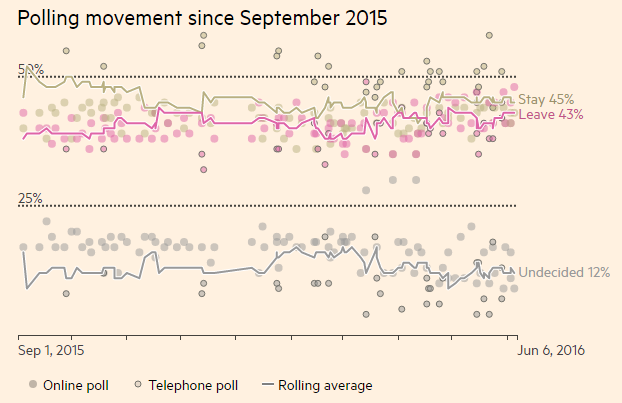British voters face a historic and critical choice about the future of the United Kingdom and the European Union on Thursday June 23.
Great Britain will organize a referendum where its citizens have the ability to answer whether the United Kingdom should remain a member of the European Union or whether the U.K. should leave the E.U.
Guest post by Chris Svorcik – Senior analyst of Admiral Markets
The British choice is really geopolitics
In my view the choice whether to stay or leave the E.U. is ultimately a question of geopolitics, which is a long-term strategic decision.
The main issue is:
…do the British voters prefer the U.K. to have an important role in the E.U…
…or do they prefer to promote their national interests outside of the EU framework?
It is unusual for political leaders to fall back on a form of direct democracy (referendum) for grand strategic decisions.
Exceptions in recent history were the previous referendums in Scotland on leaving, ironically, Great Britain in 2015 and Quebec on leaving Canada in 1995.
Both times voters choose to “stay”.
What’s at stake with a ‘Brexit’?
Simply put, the “remain” vote will provide a green light for the continued strategic cooperation between the E.U. and U.K., which allows the U.K. to influence E.U. policy from up close.
Whereas the “leave” vote will enable independent choices in foreign and economic interests.
Of course, there are dozens of other factors that weigh into the voter’s mind… the potential Brexit namely impacts commerce, finance, politics, migration, security and even agriculture.
Both the “stay” and “remain” camps put forward their own arguments and expectations.
In reality, the number of variables, factors and reactions are vast and extensive, which makes any prediction difficult and riddled with “what if” and flaws…
Brexit prediction: yes or no?
The “stay” camp average has given away its lead for the first time since September 2015.
However, the UK public is broadly divided down the middle, when we look at those who already have a strong feeling on the issue.
The key demographic will be those that “don’t know”, which is roughly 10 percent of the populous.

Last year I estimated an 80% chance of the UK staying for the EU versus a 20% chance of the UK leaving but now the odds seem closer to 50-50%.
At the end of the day I believe it will be psychologically easier for undecided voters to choose “stay” rather than “leave” because, generally speaking, change is a usually a tougher choice.
The results will be very close… however ultimately I expect the stay camp to win by a slim margin.
Will other EU countries follow?
If British voters choose for a Brexit, then there is a significant chance of other countries following the British example and eventually exiting the E.U as well.
This might not happen immediately but the potential ‘domino effect’ could destabilize and even derail the European Union…


